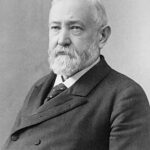The Historic Conservation Decision
President Benjamin Harrison signed the Forest Reserve Act on March 3, 1891. This groundbreaking legislation authorized presidents to establish forest reserves from public lands. The act represented America’s first systematic approach to federal conservation policy. Harrison immediately exercised this new authority with remarkable commitment.
Protecting America’s Natural Heritage
Harrison designated over 13 million acres as protected forest reserves during his presidency. 📊 The Yellowstone Park Timberland Reserve became the first official forest reserve in 1891. Additional reserves followed in Colorado, California, and Washington territories. These actions preserved crucial watersheds and prevented massive deforestation by lumber companies.
Legislative Foundation for Conservation
The Forest Reserve Act emerged from growing concerns about timber depletion and environmental destruction. Western senators initially opposed federal land withdrawals affecting their states’ economic development. ⚠️ However, conservationists like John Wesley Powell advocated strongly for protective measures. Harrison’s administration successfully balanced economic interests with environmental preservation needs.
Impact:
Birth of the National Forest System
The Forest Reserve Act laid the foundation for America’s modern National Forest System. 🌍 Harrison’s reserves eventually expanded to encompass 193 million acres across 44 states. Future presidents Theodore Roosevelt and William Taft built upon Harrison’s conservation framework. Today’s U.S. Forest Service directly traces its origins to Harrison’s pioneering legislation.
Environmental and Economic Consequences
Harrison’s forest reserves protected critical watersheds serving millions of Americans. The preserved lands prevented soil erosion and maintained water quality for agricultural regions. 💰 While initially controversial among timber interests, the reserves ultimately supported sustainable forestry practices. Local communities near forest reserves developed thriving tourism and recreation economies.
Long-term Conservation Legacy
Historians consistently praise the Forest Reserve Act as visionary environmental policy. The legislation demonstrated federal government’s responsibility for natural resource stewardship. 🔥 Harrison’s decisive action prevented irreversible environmental damage during America’s rapid industrialization period. Modern conservation movements credit Harrison with establishing the precedent for federal environmental protection that continues influencing policy today.
